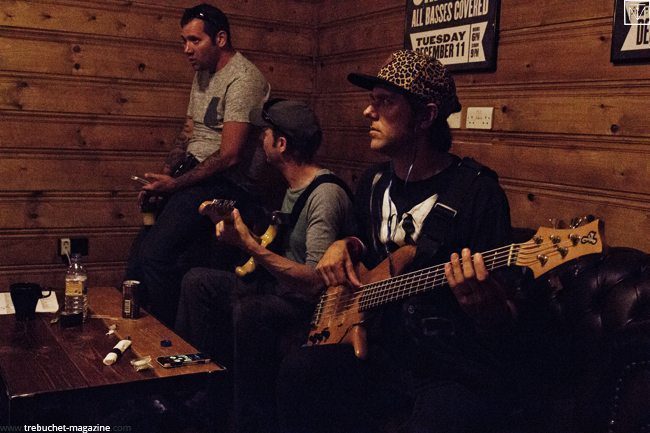[dropcap style=”font-size:100px; color:#992211;”]E[/dropcap]pic Jam rock with groove metal flourishes that revels in it’s twisty cleverness shouldn’t, by rights , be popular anywhere.
Umprey’s McGee though, fill auditoriums throughout the US and blow minds wherever they go.
Live, the band is amazing, taking the best elements of progressive rock, but ditching the Tolkien, perms and patchwork. The level of musicianship in the band is uniformly high. With turn-on-a-dime technical ability, on any given night the music can go anywhere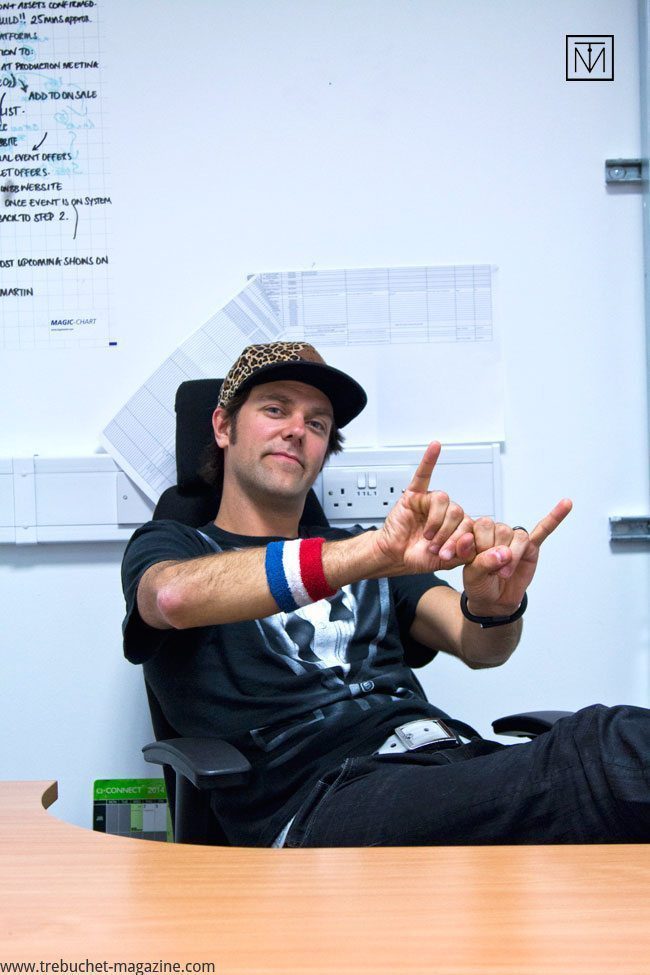 over the course of a three hour-plus show, but always returns to the audience. Keep ’em moving, keep ’em happy – Umphrey’s McGee are a smart party band par excellence and to paraphrase Jason Lee in Almost Famous: they work just as hard or harder than any band onstage and connect. They get people off. They look for the guy who isn’t getting off, and they make him get off.
over the course of a three hour-plus show, but always returns to the audience. Keep ’em moving, keep ’em happy – Umphrey’s McGee are a smart party band par excellence and to paraphrase Jason Lee in Almost Famous: they work just as hard or harder than any band onstage and connect. They get people off. They look for the guy who isn’t getting off, and they make him get off.
And they’re serious about it.
To promote their eighth album, and perhaps most album-orientated release, Similar Skin, Umprey’s McGee played three UK shows at the Brooklyn Bowl in late June 2014. Surely one of London’s most eccentric venues, as well as bowling the Bowl has a top notch fried chicken restaurant (yes such a thing exists) and a sizable concert venue.
The Brooklyn Bowl is gaining renown as a very particular home for US music in the UK, a place where on these cold and lonely shores buoyant young émigrés can smile openly with well-aligned teeth amongst similarly good-looking people in an atmosphere of authentic America. It has a homeland feel thankfully devoid of Americana that contains broad welcomes, large portions and loud speakers. What better place to hear a band tipped by Rolling Stone as favourites to win the ‘next-Phish sweepstakes’?
[quote] He’s intensely sharp.
Imagine Tigger with a scalpel[/quote]
Ryan Stasik, the gregarious 30-something bass player of Umphrey’s McGee jokes and japes behind a laminate desk, noting the white board calendar, rolodex, and Manila folders. It’s clear why this is the quietest room in the venue. We’re upstream, managerial, in the heart of the beigeness. It’s a funny place to get serious, but an honest place for an interview. After all, much of music is a business.
A study of contrasts. Ryan’s a pretty odd character: new era hat, moustache finger tattoo, and a tuxedo print t-shirt, you might remark there is something of a frat boy visual aesthetic about him. However, while energetic, he’s also intensely sharp. Imagine Tigger with a scalpel. Discussing music, Ryan exudes the same sense of focus characteristic of surgeons, pilots, and military attachés. You get in impression he reading the scene long before he reacts. There are jokes and asides, but when it concerns the band, it’s clear that Ryan and the rest of McGee take a fun job very seriously. And so with his full (and perhaps a little impatient) attention we begin.
Would you say Similar Skin is bit darker than the other albums?
I wouldn’t say it’s darker. It’s more focused on Rock ’n’ Roll. I think Mantis had more of a darker lyrical content. For this record all six of us got together and decided that we wanted to go to our roots, make a Rock ’n’ Roll record, whether it’s hard rock, pop rock, prog rock or metal.
So back to your roots?
Yeah the band’s been together for sixteen years and it’s always been about improvisation and taking chances, challenging each other and making it different etc. But our roots are Rock ’n’ Roll.
I know that you’ve sometimes had a theme on other single venue runs, have you done anything like that here for these three nights?
No, we want to just make sure that we’re bringing what we usually bring, which is an all-round rock show, you know, accompanied with lights and without repeating any songs. We did something special last night, in that we did an hour long cover set playing our biggest influences. Stuff like Steely Dan, Led Zeppelin, The Police.
Is this run part of a move to tour over here more often?
We would like that. We all have children now, so getting away is a little more difficult when you’re not getting into the green, so to speak. If we could get over here and play a little more steady and build up a crowd, it’d be wonderful. We had a great reception in the mid-2000’s in Germany, Amsterdam, and we played in London as well. But yeah, we would like to. Hopefully, with this positive experience!
Tell me about the emotional side of music for Umphrey’s McGee. Do you get emotional in your music?
Yes, we are a very emotional band. We wear our music and hearts on our sleeves every evening, and that’s the beauty of having six different leaders who can take the reins every night and improvise. If someone’s frustrated or angry or happy or elated, that’s all going to challenge the live show. Even if our drummer had not passed.
The music was already recorded for this record before he passed. It’s dedicated to him, and every night that we go on stage is dedicated to his spirit, that always helps us take it to another emotional level. But, I mean, without him, none of us would have this, he started this gangstership with us.
What sort of topics do you deal with in the songs?
Well, Brendan is the main lyricist and then Jake is also a lyricist but he’s a little more straightforward. Brendan was an English major at Notre Dame, and he’s always found it the most interesting to leave lyrics that are vague and open for interpretation. If he hits home for you in a certain way and hits home for someone different, then that’s good. He likes it like that. He doesn’t like to be completely [literal]. Someone tried to compare him to the philosopher with his legs crossed, smoking a cigar, talking in his form of being a poet. Unfortunately, I’m the wrong guy in the band to ask! I’m the bass guy.
How has the band kept together this long?
I think like any relationship, whether it’s with a husband and wife or similar, you start it, finish, and you get these wrong senses. You know where people are leading, even the look on their face and what they’re thinking, so that’s made us more cohesive. But I think because we’re always talking about it and we’re always opening our eyes and ears to go outside the box. Our fans get off on that, we get off on that, and everybody knows when you’re playing it safe and when you’re going to the stock vocab and riffs.
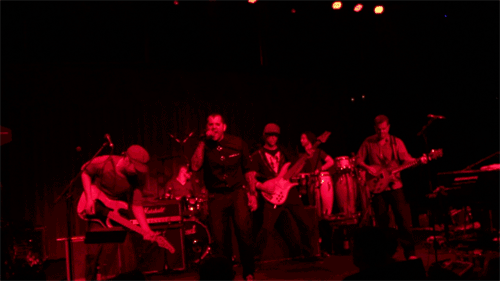
I mean, it’s difficult, it’s challenging having to do something fresh and new. And you know, 20 per cent of the time, fresh and new can be absolute sh*t, but you’ve got to shoot for that! You shoot for that and get outside of the box in the comfort. I mean, many times like that it builds tension and we come back together. Then you can see the joy in everybody’s face when it comes back, it comes back.
Like any relationship and being on the road to get together, we’re basically all married without sexual relations. So we really understand each other pretty well. I think that has developed over the last sixteen years and we just kind of know where we’re going to go. It’s made us a tighter band. We haven’t had any throw in the towel moments, or got completely stuck.
You seem like you’re all on a very even keel.
We are. We were raised with wonderful parents, and we all talk it out (laughs). We don’t recall, we don’t let petty things boil up. Everybody gets everything out. When you live within close corners on a tour bus half the year, you’ve got to talk it out, and you’ve got to get over it – you’ve got to forgive and forget, or fight and forget, or whatever order you want to put them in.
That’s what keeps everything going, because if you let the small stuff get to you, that’s serious and it’s impossible to make pure music with people on stage if you don’t like them or respect them. You can’t let the guy be next to you if you despise being around him. You’re not going to care what he’s going to bring to the table musically, and that’s going to suffer for everyone. We’re going to notice and the people watching us will notice too So, we make sure that foundation is solid first before we even get on the stage.
You usually play two sets per show. Do you make one a slow set and then a fast one?
No, there’s nothing like that. We don’t always depend on a redemption set in the second set, you know?
Though we do try keep the more acoustic or low energy tunes earlier in the night. We want to put on a dance party, like funk stuff sometimes, we want people to be having fun, so we keep the tempos up. That’s about as far as we think about constructing sets.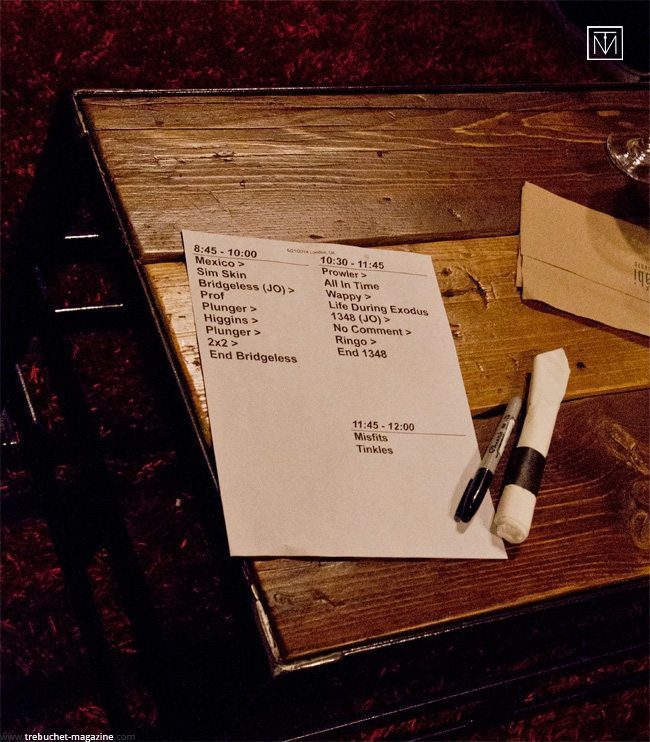
Our fans have come to expect that we’re going to play a three and a half hour show. You get a one hour, seventy-five minute set, then we give you a break, then you get another one. And you’re probably going to get an encore. I think If we started doing what major acts do and just play a forty-five minute set we’re done. I think we would lose a lot of our fans. I mean, they appreciate that, they want that. They want to be exhausted and satisfied, and hopefully we’re doing that for them.
We get fairly creative (with the setlist), we play so many shows, and it depends on where you are, too.
If you’re in a summer headline festival outside for 50,000 people, [or] are playing in a small club for twenty-five people, that’s going to change the set list. We’ve even changed it up incredibly where we did the whole first set where every song began with ‘W’.
The majority of our songs have open improvised sections, they’re just open and we’re creating songs on the spot.
We use a series of eye signals, of hand signals and of guitar signals, and we have talk-back mics on stage so that we can conduct to each other. So that really helps us to be a la Frank Zappa, to go from point A to B. However, a lot of people might compare us to the Grateful Dead, in that they’ll be like: ‘Well, they were in E minor and really psychedelic for 20 minutes, and it didn’t really go anywhere, or it did go somewhere, just took a long time.’
We’re a little more ADD, where we’ll be playing, we’ll start in 4/4 time and then say “OK, we’re going to play a riff in A minor and 7”, then cut it off and then we hit it on the dime. And it sounds really tight and looks really tight, but only we know that we’re telling each other to do that. You know, we use baseball cues and stuff like that. A whole bunch of things that we’ve developed to make our set stronger, so we don’t get stuck in ruts.
Can you tell us some codes you use or is it secret?
No, it’s not like code, we’re not hiding it from anybody.
I actually would love to see other bands do it, because I think there’ve been some (especially younger) bands that are jamming, and you can tell they’ve decided “ok let’s play in E and they stay in E for just way too long”. It would be great if they just changed it up a little bit, explored more, got out there!
Sometimes you can’t always do that with your eyes closed and just listening. It’s tighter when everybody knows what they’re going to do at the same time. For example, if I have my bass guitar and we’re in E, and I just raise it up like three times, that means we’re going to go up a minor 3rd, and then we’ll cut it off and mess around more with G. You know, we have cues to go to the four chords in any scale. Or even by any degree, 1 through 8, and little letters themselves, time signatures, half time, slow down.
We do a lot of live ‘DJing’; because there are six people up there making music. For example, the drummer will be talking about, “OK we’ll cut out to just drums and bass, and then he’ll go on to his electronic pad and do something more like a house beat. He’ll be like: ‘OK here comes the build, just guitars’, we’ll DJ people in and out to come in, instead of guessing.
It’s way tighter when you’re conducting, instead of guessing. I don’t consider it cheating. People have called it cheating. I think it’s just a way for us to make creative and tighter music. Or it seems like things flow a little bit better and it seems tighter to people who don’t know.
So it’s bass up 3 times for a 3rd up.
Yeah, bassist cues. We have winks, we have smiles as major, if you frown you’re going to be in minor. We have like fifty different cues that anybody could do any time. If you take a full step (forward) you go up a whole step, if you take half step back, you go back a half step, so we can go anywhere on the fret board or on the keyboard with a hand or an eye.
Are there any accidental cues, say if you were just walking forward …?
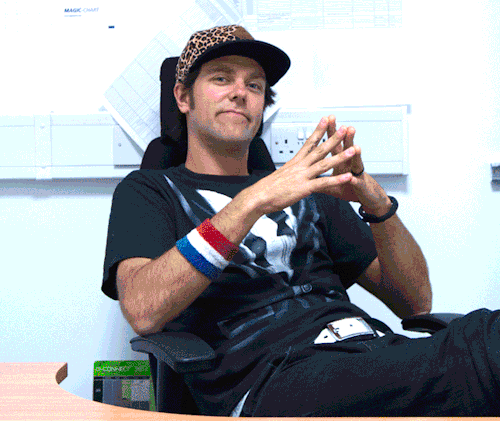
No, I mean, you can figure it out too. I mean, there’s always three of us standing, so only two guitars and a bass. We’re the only ones doing those types of cues with the guitars and stuff like that. The guys that are sitting are able to use their talk-back mics, you know.
We have funny ones, too. Some are really good. We have our tit, that means really ‘milk it’, it’s really good, and we’ll keep it going, sit on this, build it up, keep the groove, this is winning, this is right, this is working.
So, six people, and I’m sure you understand with anybody, you get six people in the room and everybody’s excited. If they all talk at the same time, what is it? It’s chaos! You’ve got to figure out how to have a conversation with six people together and make it cohesive.
Is there any, I wouldn’t say disagreement, but you know maybe two of you have got great ideas, and you’re like, ….
Fuck yeah! All the time! There are definitely times, too, when somebody is feeling it and they’ll be going like, ‘F*ck you, go with my flow!’. You tell people to stop but they’ve got to go, and so you change it.
We are very cool about that too, because we rule just like in improv comedy. If somebody starts something, if you don’t like it, too fucking bad! You go with it, you make it as good fucking possible. And you can only get out of it what it is, or you can’t hear or understand. A lot of times like these, like the guitar player starts something in five, and we’ll be like ‘OK…’, and then the drummer starts to play to the one, he’ll be like in loose time?
You know, you have to be like a magician, thinking ‘Where the f*ck is the one?’. So, you just have to stick it out musically and find what you think works best until it comes back around and it becomes cohesive. That’s the fun tension out of the box, weird stuff that we get off on.
So, you guys are obviously giving yourselves the freedom to fail, but it sounds a little bit like ‘We have to get it right!’
Or it’s like going to war. You don’t want to lose, you want to come home victorious, sweaty and bloody.
Six of you are going there and not all of you are coming back!
That’s a famous quote that we say a lot. Like in 2008-2009, our old light guy used to say that all the time. Or like ,‘Six of you are going out and five of you are coming back, figure it out!’
Bob Dylan prepped his band before a gig with ‘Fuck ’em if they can’t take a joke’
Yeah, in a sense, that’s true. I mean, we’re entertainers, we’re professionals, we’re up there for providing, you know, an emotional healing process for some.
How important is funk for Umphrey’s McGee?
Just as important as rock.
Funk is what gets the dancefloor moving, it’s what the rhythm section is, it’s the rock and then you have the church on top of it. If you’ve got a steady funk rhythm section, you can get that dancefloor moving. It’s huge.
What are particularly good shows for you? When do you know, this is actually important for you?
All of them! Every one of them is special because they’re all different.
Like I said before, you could be up there looking at a crowd with the closest person being 50 feet away and 50,000 people out there. And you don’t have the intimacy of when you’ve got the guy spilling beer on your shoe and you can spit on his head.
Both of those are awesome to me in the same way. But I feel best when the show ends and I’m fucking exhausted and I’m smiling. Just when you get a little decompression area there, but you’re satisfied with that you did and you know that the people out there had a good time.
It’s a stock question but in a band with six songwriters how do songs get written?
We’re very fortunate to have two guitar players who have been writing songs for twenty years now, and have a catalogue that’s very deep. Our guitarist Jake has thousands and thousands of songs written. He plays drums, bass, sax, keys, guitar, and sings. He does it all. So when he records, he records the analogues old school style four-track, all of it, and he has them in this catalogue. So we have those in the bag. Which is always great. We have a bunch of songs that we’ve played live and over the years, maybe threeto five years, they’ve developed and morphed from us playing them so much … right what it’s supposed to be.
So you regularly play songs that have never been released on an album?
Totally! 100 per cent! There are thousands more. We’ve written up songs just between the two guitarists to make aboutten records, and then there’s the nicer stuff (laughs).
But we don’t always go back, but we pick parts, we say ‘That riff is awesome!’, and lever things together until we have something that we’re happy with. Other times we’ll think ‘Oh, that bass riff you played on 04/19/04, that was working’. So we’ll go back and listen. We all have that catalogue.
You’ve got little live recordings?
Yeah. And we call them Legos. We say, this riff works here, if it needs to be bridged together in a certain way, we get together and we arrange it.
That’s the songs themselves, but the album has a ….
We actually got together, the six of us, in Niles Michigan, our guitarist’s studio. And we sat in the room together and we wrote music. We jammed, we played riffs, we talked, and then we figured out ‘Hey, what do you want to do here with this?’ It’s in 6, we do a jungle and jungle drum fill with toms, we discuss it. He plays that part, we get in. You just work hard, over and over, and you write together. But the cool part about this record is that when we got together for that studio session to write songs, everybody’s mind set was in rock ‘n’ roll. We didn’t want to do fall on the floor dance, we didn’t want to do disco, we didn’t want to do funk.
Not metal?
Not true metal. Rock. Rock ‘n’ roll, hard rock. But, I mean, I grew up listening to Pantera. Vocally we don’t do anything like that, but riff wise and influence wise, Stone Temple Pilots, Alice In Chains, Metallica. Guns ‘n’ Roses is my favourite band ever. Those are influences, but we wanted to stay in blues rock or hard rock or prog rock. A little bit of metal, I think the song ‘Hindsight’ is probably the closest we have to metal. And we even talked at the end, we were like, ‘Kris, we want you to go on that half time Pantera fill.’
But the album as a whole, what guides you in putting it together?
We wanted it to be cohesive. We wanted it to be rock ‘n’ roll, we wanted exact cohesion. OK, I can compare it to our last record Death By Stereo. We were all over the place and we knew it. We were trying to do a funky heavier song, and we’re like, ‘OK then, give them this, let’s go metal and then let’s go bass solo on the third song.’
Who does that? It’s probably brave and stupid. So we were all over place and that’s what we were trying to do. And it was we liked it at the time but it doesn’t work for us. This time we wanted to go with that song, ‘The Linear’, kind of that Police vibe which I love.
We wanted to introduce songs for three and a half minutes, which is not usual for us, but we wanted to frontload an album with accessible three and a half to five minute songs.
Is it an accessible album?
For Umphrey’s McGee, yes.
We’re not an accessible band, but it’s an accessible album for us. I think, ‘No Diablo’ as a single, that’s probably the one that is most out of place for the cohesiveness of the record. But it’s such a strong song, and Brendon worked so hard on the chorus and re-writing and writing and writing it.
It was so good that we felt it would be a poor choice not to include it on the record. That it had to be on there. But at the same time we were afraid to put too much stuff on the record that would take us away from the hard rock core. In the end it’s about balance.
Like work and home I suppose?
s so far away in the States, gas and bus and truck and everything out there is difficult. So you stay out for like three [quote]I think this is when we let it all out.
Don’t leave an ounce of anything
that we haven’t already used.[/quote]
We’re even changing that, next year we’re going to fly back for four days in between. So, to keep our sanity, to keep the band happy, to keep our families happy, to be home and present as fathers, that’s very important to us. And that also is what, I think, keeps everything fresh.
We did the tours back in the day when you stay out on the road for six weeks or three months, and you burn out, it grinds you. The music suffers, the people suffer, and it didn’t work for us. It works for other bands, they can live in dirt, shattered, they live in everything. For us we have to have ….
So you’ve done it, so know you don’t have to.
We’ve done it, exactly, good point.
The background point I’m getting to is that this Similar Skin, is this the commercial breakthrough album?
That’d be great! I’m just speaking from the heart. In my opinion, I don’t think we’re a commercial breakthrough band. I mean, do I think we deserve everything that we get? Yeah! Because we work very hard, that’s why we started our own record label; we want the flexibility to work on what we think is important for the fans and for us. And we know that means a shit ton more work but the rewards are way bigger.
We want to do what we do.
You’ve got your audience.
Yeah!
And to some extent, do you think it’s a big as it’s going to get?
I’m a fan of people enjoying what we do, and I would like that to expand to the other continents, be bigger. The States is tough for us to tour. I have some friends that have bands that don’t tour the States at all (Whit Crane from Ugly Kid Joe). They play in Europe, and they go to Australia. They were opening up for Guns ‘n’ Roses in, like, Tel Aviv.
For his band and what he does, he’s been through the whole 90’s thing, and he’s played for 100,000 people in South America and all over. But, to tour, to make money and sustain stuff in the States for him, he’s been saying like, it’s a pain in the ass. It’s so difficult. But over here, you can play 5,000 person clubs, you can play and open for arena bands, and it works. Why not choose what works if you can do that. Unfortunately, we haven’t broken into that. I’d love to play Tel Aviv, I’d love to play in Turkey and India, Japan.
What can we expect tonight?
I think this is when we let it all out. Don’t leave an ounce of anything that we haven’t already used. We’re emptying the gas out of the tank, to get it off. I personally thought Thursday’s show was fired-up, yesterday had a slower start, but we got there. You know, we kinda got there finally. It’s funny to see all the post-Eagles show people come in (The Eagles played at the O2 around the corner from the Brooklyn Bowl). We’re playing ‘Shine On You Crazy Diamond’, it’s a beautiful tune, and people’s eyes started opening and I was paying attention. It got thicker and thicker, and I was: ‘Okay, now I’m going to give them a taste of Van Halen and then we’ll f*cking own this place!’
I think tonight it’s like, everybody’s going home to their family and their kids, everybody had a really good time, the Stellas were flowing.
So tonight….
…Letting it all out! No rest for the wicked, no more Mr. Nice Guy!
Umphrey’s Mcgee played the new Brooklyn Bowl London on June 19th, 20th, and 21st.
http://umphreys.com/2014/06/brooklyn-bowl-london-webcasts/

Editor, founder, fan.


